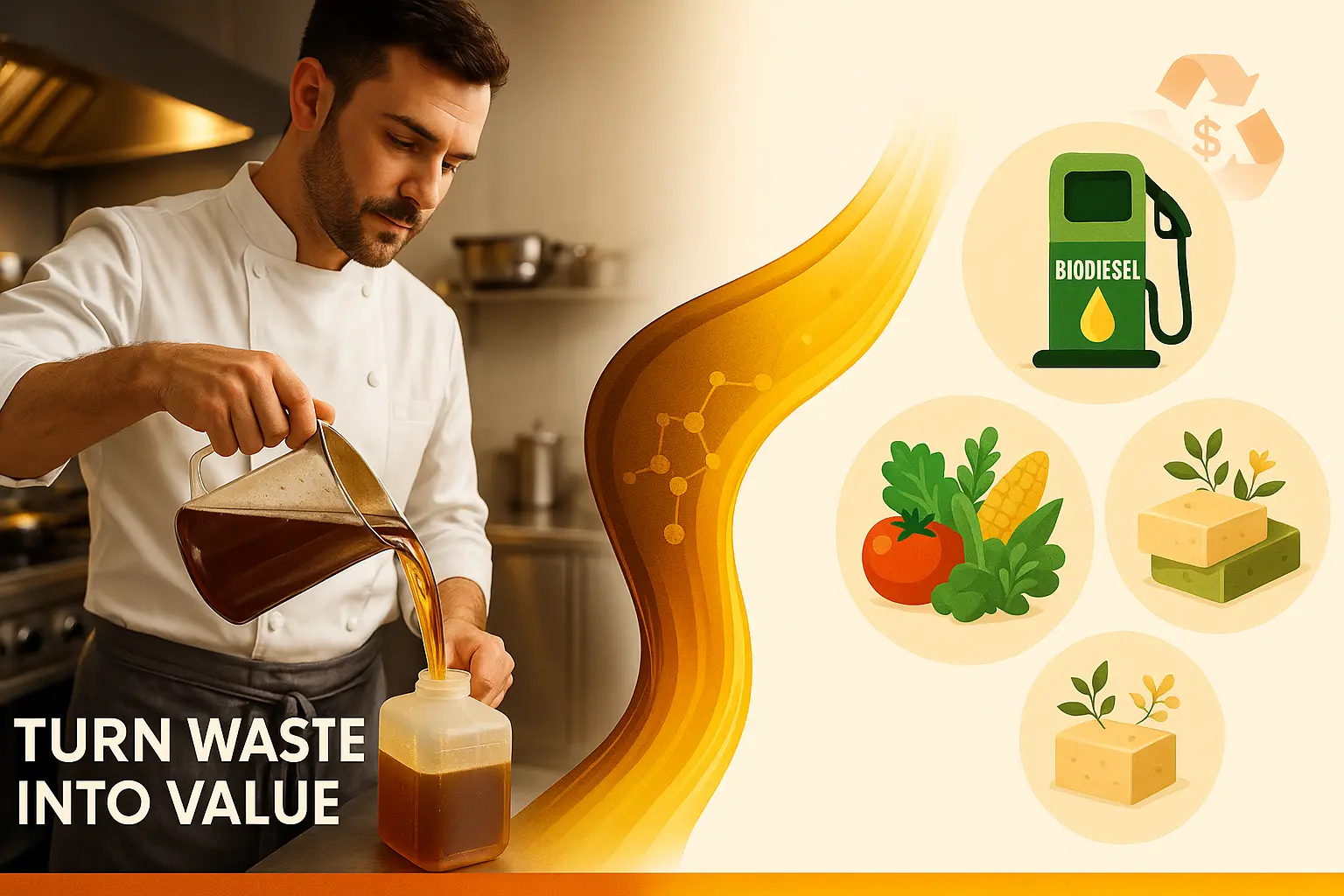Yes, cooking oil can be recycled. In fact, the question “can cooking oil be recycled?” is essential to understanding its benefits. Recycling used cooking oil can turn it into biodiesel, animal feed, and soap, reducing waste, saving money, and helping the environment. This article covers why recycling cooking oil is beneficial, how you can recycle it, and various uses for recycled oil.
Highlights 10 sec snippet
- Recycling cooking oil reduces waste, supports renewable energy production, and can increase profitability for restaurants through cash rebates.
- Proper disposal of used cooking oil is crucial to prevent plumbing issues and legal penalties, with local regulations often mandating specific disposal methods.
- Recycled cooking oil has multiple applications, including biodiesel production, animal feed, and as an ingredient in soaps and cleaning products.
Why Recycle Cooking Oil?
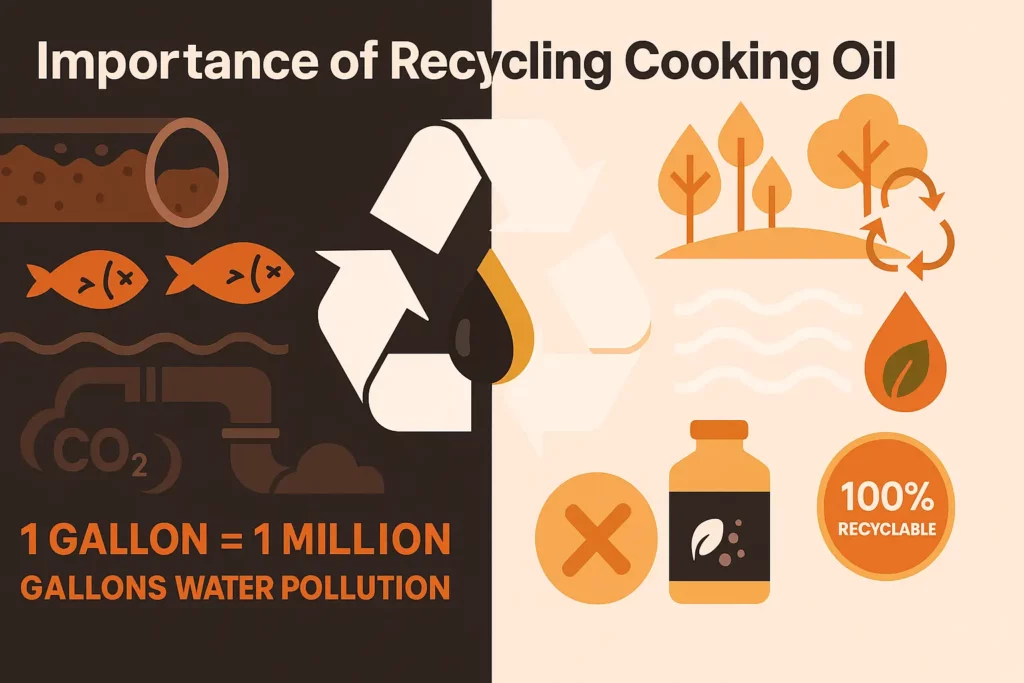
Recycling cooking oil is more than just an eco-friendly practice; it’s a smart business decision. Recycling used cooking oil helps restaurants reduce waste and conserve valuable resources. Did you know that cooking oil possesses significant energy characteristics, measured in British Thermal Units (BTUs)? This makes it an excellent candidate for recycling into renewable energy sources like biodiesel. Recycled cooking oil can also be used to heat water through biogas or biodiesel conversion, providing sustainable energy for various applications.
Biodiesel produced from recycled cooking oil offers a renewable alternative to traditional petroleum fuels, reducing reliance on fossil fuels and lowering greenhouse gas emissions. In fact, recycled cooking oil can reduce carbon emissions by up to 85% compared to petroleum fuels, making it a highly effective solution for combating climate change.
Moreover, recycled cooking oil can be transformed into a variety of valuable products, from cosmetics to animal feed. It’s satisfying to know that your used oil has a new life, contributing to various industries and reducing the demand for new oil. Biodiesel made from recycled oil can also be used to fuel trucks and other diesel vehicles, supporting cleaner transportation options. Additionally, many recycling programs offer cash rebates for the cooking oil collected, which can enhance profitability for restaurants.
Special collection events, particularly during the holiday season, simplify the process of recycling used cooking oil. So, why let your oil go to waste when it can be a source of energy, revenue, and sustainability? Grease Connections can help you with this process.
How to Recycle Used Cooking Oil
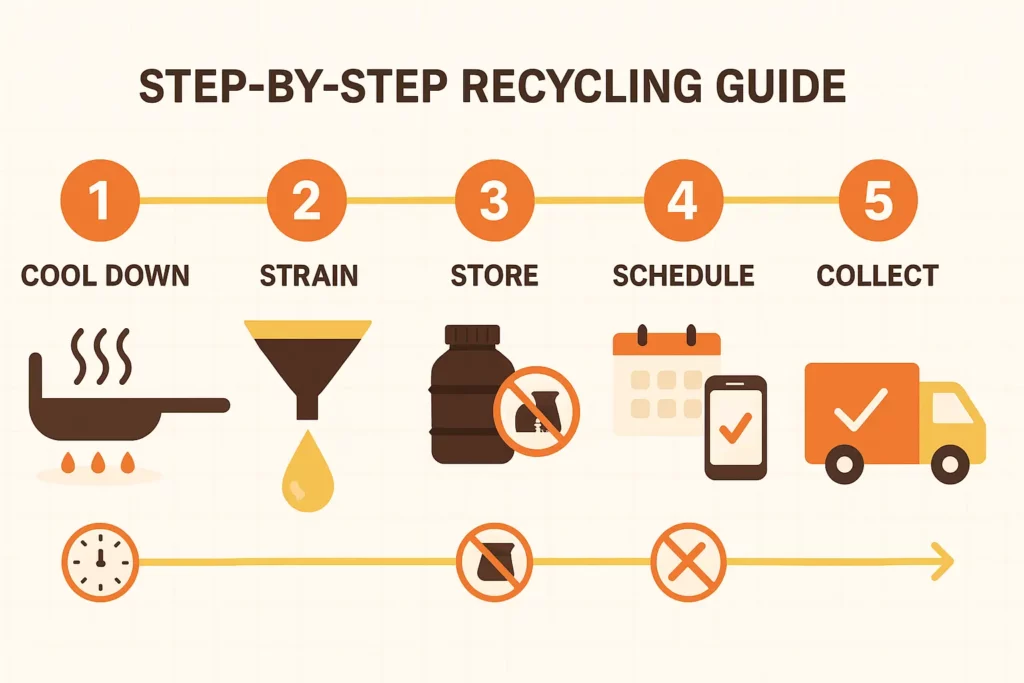
Oil used for deep frying can also be recycled, and proper handling after deep frying is important for recycling.
The process of recycling used cooking oil begins in your kitchen. Start by allowing the used oil to cool thoroughly. Hot cooking oil should be allowed to cool completely before disposal to ensure safety and prevent accidents. Once it has cooled, strain it to remove any large food particles using a sieve. Straining the oil is essential to prevent mold and bad smells during storage. After straining, use a filter to further clean the oil before recycling or reuse. Used cooking oil can be reused multiple times after filtering out food particles, making it a cost-effective and sustainable option.
To properly store your used cooking oil:
- Label a container to collect your used cooking oil. A metal coffee can or a plastic butter container works well for this purpose. After cooking, collect the oil from the pan and ensure it is properly filtered before storage.
- Refrigerate the used oil in an appropriate container to prolong its usability for longer storing.
- To reuse cooking oil safely, it should be cooled and stored in a clean, dry container.
- Store the oil for no more than three to four weeks before recycling.
Make sure to use an approved container for cooking oil recycling. A large glass jar is a good option, as glass containers are less likely to crack or leak compared to plastic. Using proper containers can help streamline the recycling process. Following these steps prepares your used oil for recycling, contributing to environmental cleanliness and business sustainability.
Various Uses for Recycled Cooking Oil
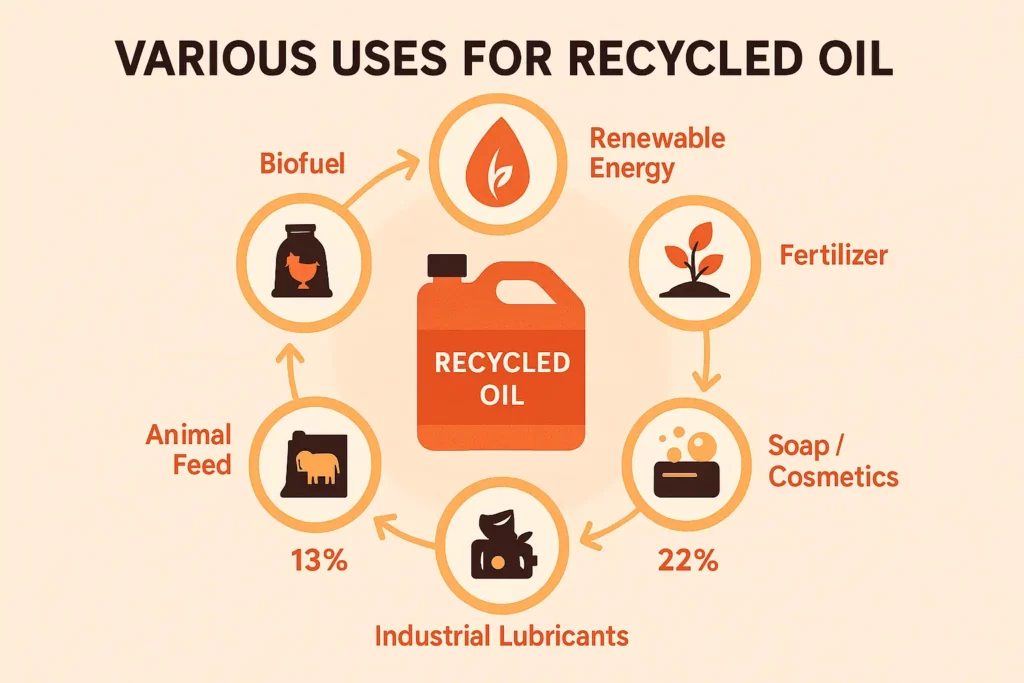
Recycled cooking oil is a versatile resource that can be repurposed in several innovative ways. Both vegetable oil and olive oil can be recycled and repurposed, helping to reduce environmental impact. After collection, used cooking oil is processed to remove impurities and convert it into new products such as biodiesel, animal feed, or soap. Additionally, it can be reprocessed into soaps, lubricants, and paints, further showcasing its wide range of applications. Whether it’s being transformed into biodiesel, incorporated into animal feed, or used in the manufacturing of reused soaps and cleaning products, the possibilities to reuse oil are vast.
These three primary uses show how recycled cooking oil can provide value long after it leaves your kitchen and can also encourage you to reuse it.
Biofuel Production
One of the most impactful uses of recycled cooking oil is in the production of biodiesel, a renewable fuel that significantly reduces reliance on fossil fuels. The process involves filtered used oil and then undergoing a chemical reaction, usually methanol, to convert it into a usable fuel.
Biodiesel can power diesel engines, offering a cleaner, renewable energy source for vehicles and machinery. Recycling cooking oil into bio diesel helps lower carbon emissions and promotes sustainable energy practices.
Animal Feed Additive
Unused cooking oil from food manufacturing can be safely added to animal feed. This practice not only enhances the nutritional value of the feed but also improves its flavor, making it more appealing to animals. Used cooking oil, due to its high nutritional value, can also be incorporated into animal feed, providing an additional sustainable use for this resource.
In pet food, recycled cooking oil adds calories and enhances the overall quality of the feed. Only appropriate types of oil should be used to maintain safety and health standards.
Soap and Cleaning Products
In soap and cleaning product manufacturing, recycled cooking oil is a valuable ingredient. It helps to bind other components and create lather, making it an essential element in soap production. Oils play a crucial role in enhancing the effectiveness of these products.
Additionally, cooking oil is often used in personal care products like shampoos due to its moisturizing properties. Repurposing used cooking oil reduces waste and creates products that benefit consumers and the environment, including those made with cooking oils.
Proper Disposal Methods for Cooking Oil
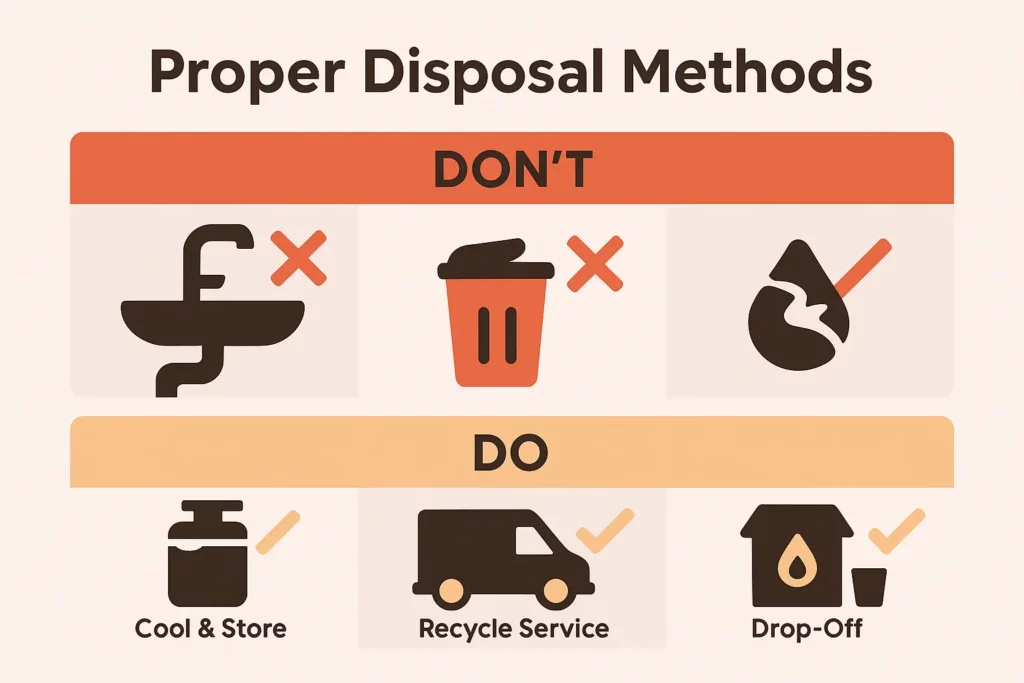
Disposing of cooking oil properly prevents environmental harm and costly plumbing issues. Pouring cooking oil down drains can cause significant blockages and damage your plumbing system. You should never pour cooking oil down the drain or into sinks, as this can cause clogs and environmental harm. In fact, around 47 percent of U.S. sewer overflows are caused by fat and oil clogs, leading to draining disruptions in municipal sewage systems. Hot oil solidifies when cooled and can clog wastewater pipes, further exacerbating these issues. Cooking oil disposal should be treated as household hazardous waste to prevent environmental damage.
For operations generating over 200 gallons of used cooking oil monthly, consider the following storage and disposal options:
- Use enclosed indoor tanks for storage.
- If local recycling options are unavailable, seal the cooking oil in a container.
- Small quantities of cooled oil can be safely disposed of in the garbage, but larger amounts should be taken to a recycling center or drop-off location.
- Small amounts of used cooking oil can also be disposed of in tightly sealed, unbreakable containers in the trash to ensure safe handling.
- Discard the sealed container in the regular trash.
Oil and grease should be kept out of the plumbing system to prevent leaks and blockages.
Food service facilities should install a grease trap to prevent cooking oil from entering the sewer system, with regular maintenance and cleaning being essential. Oil and grease from pans should be wiped with a paper towel before washing to prevent them from entering the plumbing system. Additionally, excess food waste should be scraped off pots and pans before washing to further reduce the risk of grease entering drains.
Used cooking oil is supposed to be disposed of in sealed containers and never poured down the drain. Improper disposal can result in leaks that harm the environment and cause plumbing issues.
Improper Disposal Risks
Improperly disposing of cooking oil can cause severe plumbing problems and sewer backups. Even small amounts of oil can accumulate over time, contributing to significant drainage issues that can lead to a sink. Attempting to use hot water or dish soap to break down the oil does not prevent fatbergs from forming in the sewer.
Fatbergs, massive conglomerations of fat and oil, can block wastewater flow and cause hazardous conditions. Sewer pipes backups due to improper oil disposal can create unpleasant environments and pose public health risks. Homeowners may face a large amount of significant repair costs due to clogged pipes and large amounts of debris.
Improper disposal may lead to fines and potential business closures for food service establishments, as outlined in local regulations, if they do not properly dispose of waste or dump it improperly.
Compliance and Legal Considerations
Adhering to local regulations is essential for proper cooking oil disposal. In areas like California, specific regulations enforce ordinances related to organic waste disposal, with penalties for non-compliance. Regulations often require used cooking oil to be stored in designated containers for safe disposal and recycling. Commercial kitchen operations must comply with strict guidelines for cooking oil disposal and recycling, often requiring specialized equipment and adherence to environmental and safety standards.
Audit management software can help restaurants by:
- Tracking compliance across multiple locations
- Analyzing trends over time
- Providing customized audit checklists that allow for tailored assessments to meet specific operational requirements for different restaurant locations.
These practices ensure adherence to health and safety regulations, helping to avoid costly fines.
Tips for Reducing Cooking Oil Usage
Reducing cooking oil usage conserves resources and promotes sustainability. Using non-stick cookware, for instance, reduces the amount of oil required for cooking. Choosing the right pans, such as non-stick pans, can further help reduce oil usage and prevent grease buildup that may lead to plumbing issues. Incorporating methods such as grilling or steaming can further minimize oil usage, while also considering the role of cooking fats.
Sautéing with water instead of oil effectively reduces overall oil consumption. Using these methods in commercial kitchens leads to significant environmental and economic benefits, making it essential for restaurant owners.
Our Recycling Service
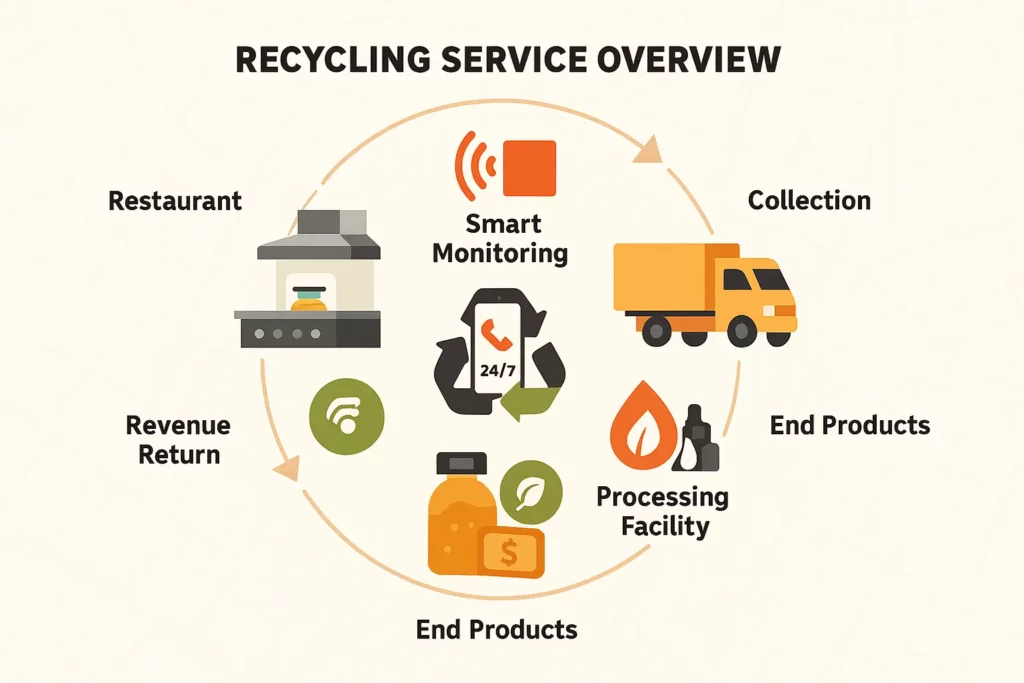
Our service makes cooking oil recycling convenient and efficient for restaurants. Key features include:
- Early morning collecting services starting as early as 3 AM, ensuring minimal disruption to your operations.
- Provision of a 70-gallon caddy equipped with sensors to monitor oil levels, ensuring timely collection and preventing overflow.
- Automated PDF manifest generated with each collection for easy tracking and compliance documentation.
More than 400 Georgia restaurants are currently using our service, benefiting from our reliable and efficient recycling solutions. By choosing our meal service, companies pour compliance into cash while contributing to a sustainable future.
Check Your Container Size
Choosing the right container size is crucial to prevent overflow and emergency pickups, ultimately saving costs for restaurants. Our specialized UCO calculator can help determine the optimal container size based on:
- Fryer count
- Oil capacity
- Daily top-off percentage
- Operating days
- Pickup frequency.
Utilizing this calculator ensures efficient oil management and helps match your monthly oil output to the appropriate container size. Check your container size with our free UCO calculator to optimize your oil recycling process.
Book a Photo-Based Site Audit
Our photo-based site audit offers several benefits:
- Allows you to assess compliance without needing an on-site visit, enhancing efficiency and convenience.
- Provides clear evidence of compliance and operational conditions through photo documentation during audits.
- Ensures your restaurant meets all health and safety regulations.
Book a photo-based site audit to streamline your compliance process and maintain high operational standards.
Summary
Recycling cooking oil is a vital practice for reducing waste, conserving resources, and contributing to a sustainable future. By understanding the proper methods of recycling and disposal, you can avoid environmental harm and costly plumbing issues. The various uses for recycled cooking oil, from biodiesel production to soap manufacturing, showcase its versatility and value.
Our recycling services provide a convenient solution for Georgia restaurant owners, ensuring compliance, efficiency, and profitability. Check your container size with our free UCO calculator and book a photo-based site audit to optimize your recycling process. Join us in making a positive impact on the environment and your bottom line.

